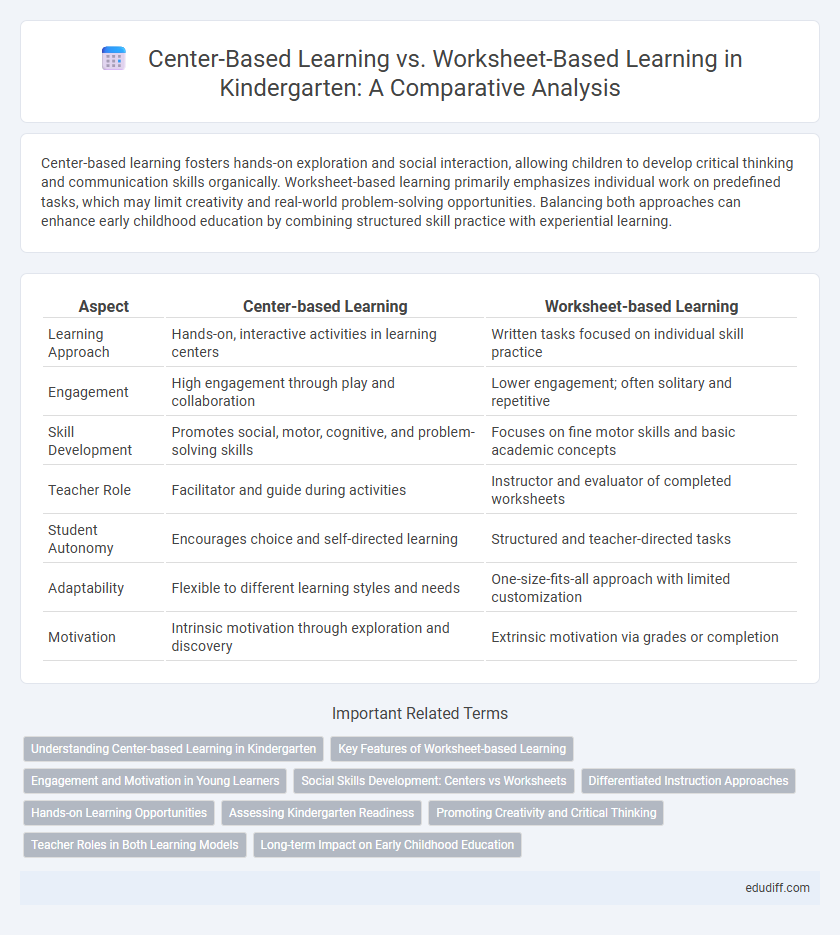Center-based learning fosters hands-on exploration and social interaction, allowing children to develop critical thinking and communication skills organically. Worksheet-based learning primarily emphasizes individual work on predefined tasks, which may limit creativity and real-world problem-solving opportunities. Balancing both approaches can enhance early childhood education by combining structured skill practice with experiential learning.
Table of Comparison
| Aspect | Center-based Learning | Worksheet-based Learning |
|---|---|---|
| Learning Approach | Hands-on, interactive activities in learning centers | Written tasks focused on individual skill practice |
| Engagement | High engagement through play and collaboration | Lower engagement; often solitary and repetitive |
| Skill Development | Promotes social, motor, cognitive, and problem-solving skills | Focuses on fine motor skills and basic academic concepts |
| Teacher Role | Facilitator and guide during activities | Instructor and evaluator of completed worksheets |
| Student Autonomy | Encourages choice and self-directed learning | Structured and teacher-directed tasks |
| Adaptability | Flexible to different learning styles and needs | One-size-fits-all approach with limited customization |
| Motivation | Intrinsic motivation through exploration and discovery | Extrinsic motivation via grades or completion |
Understanding Center-based Learning in Kindergarten
Center-based learning in kindergarten emphasizes hands-on activities and interactive play, fostering critical thinking and social skills development. This approach encourages creativity and problem-solving by engaging children in thematic centers tailored to diverse learning styles. Research shows that center-based learning enhances motivation and deeper conceptual understanding compared to worksheet-based tasks.
Key Features of Worksheet-based Learning
Worksheet-based learning in kindergarten emphasizes structured practice through printed materials that reinforce literacy and numeracy skills. This method supports fine motor development and cognitive recall by guiding children through repetitive exercises tailored to early learning standards. Worksheets enable easy tracking of progress and provide opportunities for individualized instruction based on specific educational goals.
Engagement and Motivation in Young Learners
Center-based learning in kindergarten fosters active engagement by encouraging hands-on exploration, imaginative play, and social interaction, which significantly boosts motivation in young learners. In contrast, worksheet-based learning often limits engagement to passive tasks, reducing curiosity and enthusiasm for learning. Research indicates that children in center-based environments exhibit higher levels of sustained attention and intrinsic motivation, critical for early cognitive and emotional development.
Social Skills Development: Centers vs Worksheets
Center-based learning in kindergarten promotes social skills development by encouraging collaboration, communication, and problem-solving among peers during interactive activities. In contrast, worksheet-based learning tends to isolate children, limiting opportunities for social interaction and teamwork. Engaging in center-based environments enhances children's ability to share, negotiate, and build relationships, crucial for early childhood social competence.
Differentiated Instruction Approaches
Center-based learning in kindergarten enhances differentiated instruction by providing interactive, hands-on activities tailored to diverse learning styles and developmental levels, promoting engagement and collaboration. Worksheet-based learning often lacks this adaptability, focusing primarily on uniform tasks that may not address individual student needs or preferences. Incorporating center-based strategies supports personalized learning pathways, fostering critical thinking and social skills more effectively than traditional worksheets.
Hands-on Learning Opportunities
Center-based learning in kindergarten fosters hands-on learning opportunities by engaging children with tangible materials and interactive activities that promote sensory exploration and fine motor skills development. In contrast, worksheet-based learning primarily emphasizes passive skills such as writing and coloring, offering limited scope for experiential learning. Research shows that hands-on engagement in center-based settings enhances cognitive growth and social interaction more effectively than worksheet-centric approaches.
Assessing Kindergarten Readiness
Center-based learning enhances kindergarten readiness by promoting social interaction, problem-solving skills, and hands-on experiences, which are crucial for cognitive development. In contrast, worksheet-based learning primarily focuses on rote memorization and fine motor skills, often lacking the engagement necessary to assess comprehensive readiness. Research indicates that children exposed to center-based environments demonstrate higher adaptability and school readiness indicators than those relying solely on worksheets.
Promoting Creativity and Critical Thinking
Center-based learning in kindergarten encourages hands-on exploration and collaborative play, fostering creativity and critical thinking by allowing children to experiment and solve problems in dynamic environments. In contrast, worksheet-based learning often emphasizes rote practice and repetitive tasks, offering limited opportunities for imaginative expression or complex reasoning. Prioritizing center-based activities supports holistic development by engaging multiple senses and promoting active inquiry, essential for building foundational cognitive skills.
Teacher Roles in Both Learning Models
In center-based learning, teachers act as facilitators who guide exploration, encourage collaboration, and tailor activities to individual interests, fostering hands-on engagement and social development. In worksheet-based learning, teachers primarily serve as instructors who provide structured tasks, assess academic skills, and ensure mastery of specific concepts through repetition and practice. Both roles require adaptability, but center-based learning emphasizes interactive support, whereas worksheet-based learning focuses on direct instruction and skill reinforcement.
Long-term Impact on Early Childhood Education
Center-based learning fosters social interaction, hands-on exploration, and critical thinking skills that support cognitive and emotional development in early childhood education. In contrast, worksheet-based learning often prioritizes rote memorization, which may limit creativity and problem-solving abilities over time. Long-term, center-based approaches contribute to more adaptable, engaged learners with stronger foundational skills.
Center-based Learning vs Worksheet-based Learning Infographic

 edudiff.com
edudiff.com